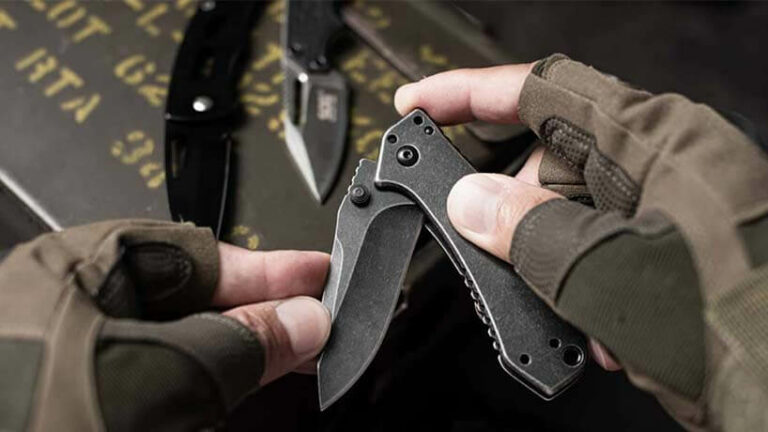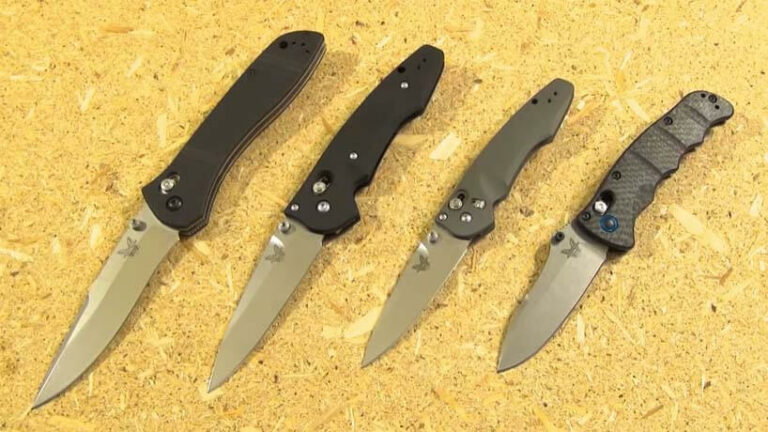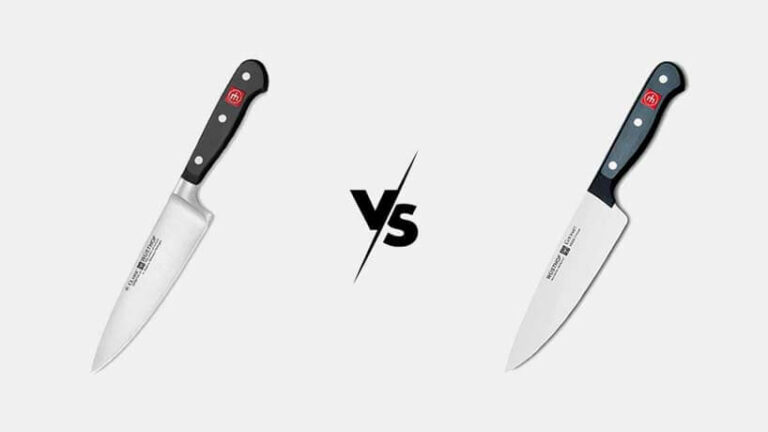You’re thinking about getting yourself a trusty and high performing pocket knife, but it’s tough to decide which brand to go with. Your friends have conflicting opinions and every video you watch online supports a different brand. We understand how frustrating it can be to choose your next knife, especially with the wealth of impressive options on the market.
How do you choose the best knife for your budget? How long will the knife last? What’s special about each brand? It would take forever to compare every single brand on every single important aspect, so we’re going to match two of the biggest names in the pocket knife industry here today. In this Benchmade vs Kershaw breakdown and guide, we’re going to show you what’s worth paying attention to.
You’ll learn where the knives excel, different price points and more. Our goal is to help you find a knife that suits your budget, planned uses, experience, and style preference. We want you to get a knife that makes you better, and something worth showing off to your friends the next time you have them over for a BBQ! Let’s dive in!
Benchmade Vs Kershaw: Comparing Key Features
In the coming sections, we’re going to compare each of the brands by their key features. There is quite a wide range of product lines and knife types from both Kershaw vs Benchmade. We’re not going to compare every single product line. We’ll be looking at what common features show up in most of their knives. You’ll learn how Kershaw and Benchmade differ in terms of:
- Blade and handle materials
- Blade and knife design
- Uniqueness
- Value for money and price
- Performance and durability
- Ease of use and maintenance difficulty
- Aesthetics and more
We’ll go through the key features by topic so that you can decide which brand hits the proverbial nail on the head. If you’re just getting started and this is your first pocket knife, it’s a good idea to write down the features you think are most important to you. Think about weight, usability, durability, and price.
As you make your way through this comparison, keep these important features in mind and use that as your frame of reference. That way, it will be far easier for you to decide whether Kershaw or Benchmade knives are a good match for you. Keeping all this in mind, let’s get to our Kershaw vs Benchmade comparison!
Blade Design and Quality

Benchmade tends to be stricter in terms of the steel they use in their knives. You’ll usually find high-quality steel like S30V in Benchmade knives. This higher quality steel wears exceptionally well and holds a fantastic cutting edge for longer than most competitors’ knives. This is great for pocket knives but you’ll have to sacrifice the aspect of easy maintenance.
You’ll find most Benchmade knives are harder to sharpen and take longer to maintain – though it is made a little easier by the standard straight cutting edge most of their models use. Benchmade’s knives have good rust resistance and the blade’s coating (on some knives) doesn’t come off easily.
This isn’t to say that Kershaw doesn’t have what it takes to compete with Benchmade’s steel quality – though you do need to be a little pickier. While Kershaw knives use a wider variety of steel for their blades, you can find premium options relatively easily. Kershaw is excellent for offering value-for-money when it comes to steel quality.
Their knives have decent edge retention and are easy to maintain, especially if you have experience with sharpening curved cutting edges. This can be a drawback as you’ll need to carry around extra sharpening tools that can be used to work on curved blades. You’ll find a wider variety of knives from Kershaw that can suit diverse budgets. Quality is excellent at the higher end and value-driven at the lower end.
Regardless of which brand you choose, you’re going to get excellent cutting edges with enough durability to justify the price. If you’re set on getting a high-quality pocket knife, then Benchmade might be right for you. If you don’t mind shopping around a bit and you know what you’re looking for, you might find Kershaw has a better selection for you.
Handle Design and Quality
Once again, Benchmade has taken the more streamlined route here. Most of their knives use a textured fiberglass-reinforced handle. It’s lightweight, durable, affordable, and can be colored easily. If you’ve ever owned a Benchmade knife before, you’ll find your next knife feels very familiar.
When it comes to choosing an effective EDC pocket knife, this predictability tends to make the knives more reliable and keeps you within the Benchmade ecosystem. Kershaw on the other hand – like their choice of steel – varies quite wildly. You can get Kershaw knives with stainless steel handles, with almost no texturing or ergonomics.
At the other end of the scale, you can find high-grade and affordable Kershaws with robust and easy to hold G10 handles. Generally speaking, you’ll find Benchmade knives to be more ergonomic, lighter, and more textured than Kershaw knives. The exception would be Kershaw knives that use G10 handles.
They offer the best quality– especially within their price range. All-in-all, if you want a handle that feels familiar and standard, then Benchmade is probably better for you. If you want to try something new (and potentially better) then go with a Kershaw – though you get hands-on with the knife before making up your mind.
Price and Performance
As we’ve already hinted at, Benchmade knives are generally more expensive. There are outliers from Kershaw that cost the same or more than some of Benchmade’s options. You’ll find a more budget-friendly and value-for-money choice among Kershaw’s offerings. This isn’t to say that you won’t find great value with a Benchmade knife, but you’ll need to choose and compare more carefully.
Performance at the higher end of both brands’ lineups is excellent. You’re getting premium-quality steel, durability, ease of use, and versatility. If you decide to go with a lower range Kershaw knife, there’s a little give-and-take. You’ll find some excellent knives with standout features like durability – but not every aspect will be top-of-the-range.
If you don’t want to shop around too much, you’ll have less trouble finding a premium Benchmade knife. If you like to take your time and find more affordable knives, while still playing to your strengths and planned uses, then Kershaw is likely the better option.
Lock Type and Quality

Benchmade knives come with the well-renowned Axis lock. It’s a sturdy and reliable lock type that you can use ambidextrously. Axis locks are sturdy and very durable, often outlasting lock types on similarly priced knives. You’ll find they are fast and easy to use once you get the hang of them – though this can take quite a while since they’re quite different from other common lockups.
The Axis lock is found at the base of the blade. Once you get used to it, you can quickly deploy the knife with either hand. Axis locks are generally lighter and less space-consuming than many other lockups. On the other hand, Kershaw is known for its snappy assisted opening knives and their frame-locked models. These have the benefit of being familiar and easy to learn to use.
You can build up speed and muscle memory very quickly – especially if you’ve owned a knife with a similar lockup before. Kershaw’s locks are usually a little heavier than what Benchmade offers, though they are exceptionally strong and durable. They also tend to be less expensive to produce than Axis locks, which keeps the total price of the knife affordable.
Kershaw knives that use frame locks are exceptionally strong and last for a long time as they don’t have a ton of moving parts. They’re easy to maintain and make minor adjustments to suit your preference. Kershaw locks can be easily operated with either hand and are relatively simple to maintain.
Portability and Usability
This comes down to personal preference and experience. Benchmade knives are generally heavier, but their standard shape and design make them easy to carry around. Even though they’re a bit heavier, they’re not going to weigh your pocket down too much. You’ll find the difference isn’t as drastic as it seems on paper.
In both Kershaw’s and Benchmade’s premium ranges, knife weight is very similar – though Kershaw’s unique designs and blade shapes make them a little harder to maintain. Both knives have excellent (and often reversible) pocket clips, though the details vary widely depending on the model you choose.
Final Thoughts
Regardless of which brand you choose, both are excellently and expertly designed. These are knives that have been refined and perfected over decades. If you have past pocket knife experience, you’ll find this choice is much easier as you already have quite a good idea of what you’re looking for.
If this is going to be your first knife, you should ask some enthusiast friends what they think and what their preferences are. Take what you’ve learned here in our Benchmade vs Kershaw breakdown and put your new knowledge to the test. Write down what you’re looking for, compare it with some friends, and you’ll get a knife that’s just right for you!







